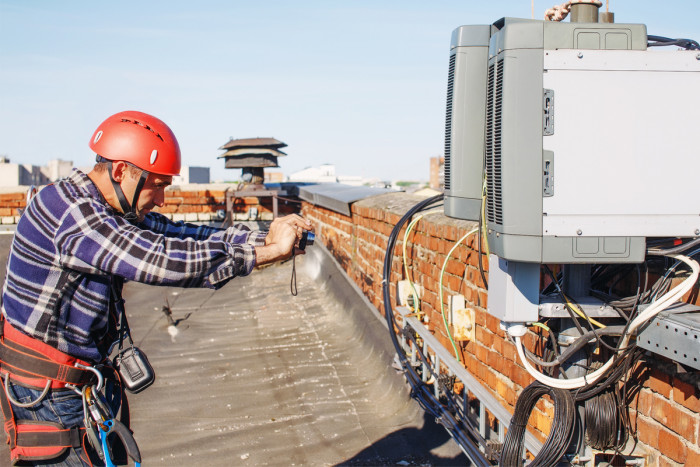Telecommunications Technician
Kaihangarau Torotoro Waea
Alternative titles for this job
Telecommunications technicians install, maintain and repair electronic communications equipment in telecommunications networks and internet supply systems.
Pay
Telecommunications technicians with up to five years' experience usually earn
$49K-$75K per year
Senior telecommunications technicians with more than five years' experience usually earn
$75K-$95K per year
Source: Connexis and Downer, 2020.
Job opportunities
Pay
Pay for telecommunications technicians varies depending on experience.
- Telecommunications technicians with up to three years' experience usually earn between minimum wage and $52,000 a year.
- Technicians with three to five years' experience usually earn $52,000 to $75,000.
- Senior technicians with more than five years' experience usually earn $75,000 to $95,000.
Sources: Connexis and Downer, 2020.
- PAYE.net.nz website - use this calculator to convert pay and salary information
- Employment New Zealand website - information about minimum wage rates
(This information is a guide only. Find out more about the sources of our pay information)
What you will do
Telecommunications technicians may do some or all of the following:
- examine telecommunications equipment and systems to find and repair faults
- update and maintain existing equipment
- install equipment, and connect it to telecommunications networks
- test repaired, updated, or newly installed telecommunications equipment
- assist with selecting sites for equipment.
Skills and knowledge
Telecommunications technicians need to have knowledge of:
- electronics and electrical circuits
- computer software and hardware
- new technology, including communication technologies
- how to use tools and testing equipment
- first aid and health and safety regulations.
Working conditions
Telecommunications technicians:
- usually work regular business hours, but may also work evenings and weekends, and be on call
- work indoors in workshops, offices and telephone exchanges, and outdoors at various sites
- may work at heights, in confined spaces, and in dirty or dusty conditions
- may travel locally.
What's the job really like?

Blair Jackson
Telecommunications Technician
What led you to become a telecommunications technician?
"Being stuck in a factory job doing the same thing over and over got pretty boring – every day was the same. An opportunity popped up for a telecommunications apprenticeship, and with my interest in the outdoors, technology and how things work, it was a no-brainer."
What do you enjoy most about your work?
"The variety of work available. Every day there is something different.
"One day you might be installing broadband for multiple customers in the city; the next you might be finding faults in an underground cable in the countryside. It’s never boring."
What do you find most challenging about your work?
"Working in a variety of conditions – at heights, under floors, in ceilings – can be challenging but is all part of the job. We’re also at the mercy of the weather – sun, wind, rain or snow – we work in it all. It can be tough at times but also very rewarding in terms of the sites and places we visit."
What advice would you give to someone interested in becoming a telecommunications technician?
"The same advice I was given when I started – take every opportunity that is presented. There is so much to learn and the best way to take it all in is to just get stuck in."
Entry requirements
There are no specific requirements to become a telecommunications technician. However, many employers prefer to hire telecommunications technicians who have or are working towards a qualification such as a New Zealand Certificate in Telecommunications (Level 2, 3 or 4).
Secondary education
There are no specific secondary education requirements to become a telecommunications technician. However, maths, physics and construction and mechanical technologies are useful.
Personal requirements
Telecommunications technicians need to be:
- practical, quick and efficient
- accurate, with an eye for detail
- responsible, alert and safety-conscious
- good at problem solving
- good communicators
- able to work well in a team and on their own.
Useful experience
Useful experience for telecommunications technicians includes:
- engineering
- work with electronics
- computing
- telecommunications work.
Physical requirements
Telecommunications technicians need to:
- have normal colour vision to distinguish between different circuits and cables
- have steady hands
- be comfortable working in confined spaces or at heights.
Find out more about training
- Connexis
- 0800 486 626 - askus@connexis.org.nz - www.connexis.org.nz
What are the chances of getting a job?
Shortage of telecommunications technicians in New Zealand
Demand for telecommunications technicians is strong due to:
- government investment to replace outdated emergency communications infrastructure
- government investment in high-speed broadband
- increased use of internet and mobile technology.
As a result, telecommunications technician, cabler (data and telecommunications) and telecommunications cable jointer all appear on Immigration New Zealand’s construction and infrastructure skill shortage list. This means the Government is actively encouraging skilled telecommunications technicians from overseas to work in New Zealand.
According to the Census, 3,096 telecommunications technicians, 84 telecommunications technical officers or technologists, and 210 cablers (data and telecommunications) worked in New Zealand in 2018.
Most technicians employed by phone or internet companies
Most telecommunications technicians are employed by telephone or internet providers, installers and servicing companies.
Some telecommunications technicians work for independent contractors or are self-employed.
Sources
- Bennett, M, recruitment adviser, Downer, careers.govt.nz interview, June 2020.
- Immigration New Zealand, 'Construction and Infrastructure Skill Shortage List', 27 May 2019, (www.immigration.govt.nz).
- Ministry of Business, Innovation and Employment, 'Fast Broadband', accessed June 2020, (www.mbie.govt.nz).
- Scott, T, marketing manager, Connexis, careers.govt.nz interview, June 2020.
- Stats NZ, '2018 Census Data', 2019.
- Strang, B, 'Radio Network Used by Emergency Services Predicted to Fail by 2023', 18 June 2020, (www.rnz.co.nz).
(This information is a guide only. Find out more about the sources of our job opportunities information)
Progression and specialisations
Telecommunications technicians may progress to become telecommunications engineers.
Telecommunications technicians can specialise in areas such as radio, cable or internet services.
Last updated 25 March 2025


